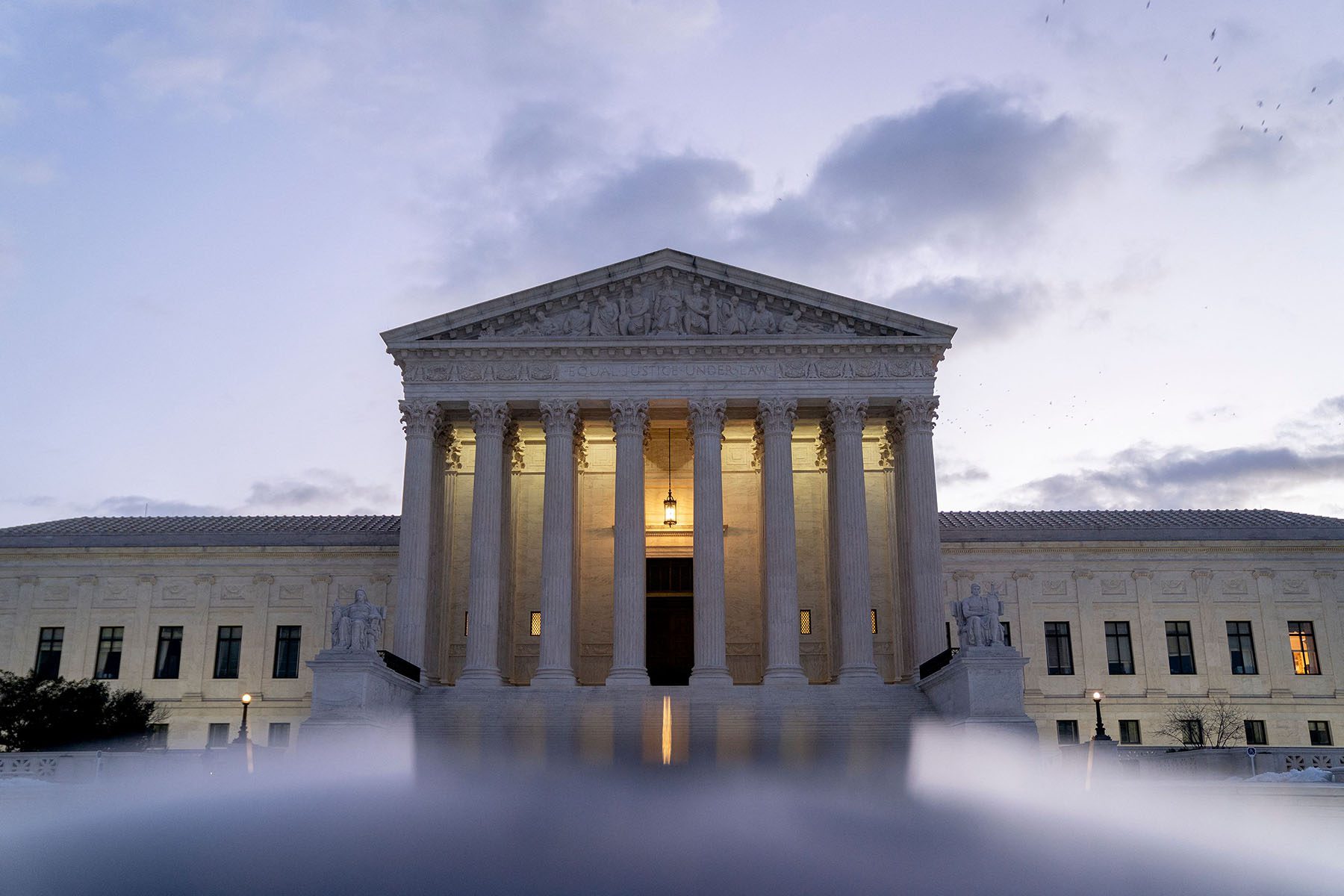Lawmakers and advocates are preparing for a Supreme Court ruling this summer that could weaken Roe v. Wade, the 1973 decision that enshrined federal abortion protections. But across the political spectrum, many are anticipating a decision that leaves plenty of room for legal interpretation and litigation, meaning it could take months to fully understand the implications for abortion access.
“There’s going to be so much we don’t know,” said Elizabeth Nash, who tracks state policy at the Guttmacher Institute, a widely cited research organization that supports abortion rights. “I don’t think the court is going to make this easy.”
The justices are currently deliberating over Dobbs v. Jackson Women’s Health Organization, a case ostensibly about the constitutionality of a 15-week abortion ban passed in Mississippi. But the state has also asked the conservative-majority court to use the case to overturn Roe. Legal observers expect it to, at a minimum, weaken the Roe protections — though many debate what constitutes weakening the precedent and what is fully overturning it. A ruling is expected to come most likely in June.
But whether Roe is weakened or overturned, state officials will likely have enormous latitude in their next steps. Many of the laws currently on the books leave significant authority to state attorneys general and other authorities to decide how to interpret the decision or how to enforce abortion restrictions.
Can older bans be revived?
Four states have pre-1973 abortion prohibitions on the books that have never been repealed. While it’s unclear what would happen to those if the Supreme Court overturns Roe, in at least one of those states officials are moving now to make the question moot.
Two lawsuits were filed in Michigan Thursday morning in state court arguing that its old abortion ban violates its constitution as well as its civil rights laws. One is filed by Gov. Gretchen Whitmer, who has separately asked the state’s Supreme Court to recognize a constitutional right to an abortion. A second, filed by the local Planned Parenthood affiliate, would compel the attorney general not to enforce the state’s abortion ban.
-
More from The 19th
- Ketanji Brown Jackson will be the first Black woman justice. Here’s how she will change the Supreme Court.
- Medication abortions — the most common method of ending a pregnancy — are growing significantly more expensive
- Why so many abortion restrictions are working their way through state legislatures now
Both Whitmer and Michigan’s attorney general, Dana Nessel, are Democrats up for reelection this fall — meaning they could in a matter of months lose the power to enforce or challenge the state’s abortion ban.
“No matter what happens to Roe, I am going to fight like hell and use all the tools I have as governor to ensure reproductive freedom is a right for all women in Michigan,” Whitmer told The 19th. “If the U.S. Supreme Court refuses to protect the constitutional right to an abortion, the Michigan Supreme Court should step in.”
Barring legislation or legal action before the Supreme Court’s ruling, it’s not entirely clear what would happen in Michigan and the three other states that lack trigger laws but that do have unrepealed pre-Roe abortion bans: Alabama, Wisconsin and West Virginia. Resuscitating a historic ban that was previously deemed unconstitutional is uncharted territory in American constitutional law.
And there is some debate over whether these laws — particularly one like West Virginia’s, which was passed in the mid-1800s — must be reapproved by the state legislature before they could take effect, or whether a federal court would have to certify that they can now take effect. But there is little legal scholarship on these questions.
The decision over whether those bans could be immediately enforced is likely to fall at least in part in the laps of the state’s governor and attorney general, Nash said.
“What happens then? Does that law become revived? I think there has to be some kind of state action to either implement the law, or act under it,” said Rachel Rebouche, the interim dean of Temple University’s Beasley School of Law and an expert in reproductive health law.
Still, she said, it’s a “thorny” question of what enforcement would take.
What happens with ‘trigger bans’?
Since 2005, 13 states have passed “trigger bans,” which would ban abortion entirely if Roe were overturned. The mechanics and timing of these bans vary.
Four trigger bans — in Arkansas, Mississippi, Missouri and Oklahoma — require that, before the ban takes effect, the state’s attorney general first interprets the Supreme Court’s decision and certifies that it has in fact overturned the 1973 decision. All four of those states have Republican attorneys general who generally oppose abortion rights.

In North Dakota, the attorney general would have to say that the abortion bans are now considered constitutional, and then the state’s legislative council — a nonpartisan component of the legislature — must approve that recommendation. In Utah, the nonpartisan legislative research and general counsel’s office must certify that the state can ban abortion after a Supreme Court ruling. But if there is any ambiguity on this point, that could open up the state ban to legal challenges.
“If the central ruling of Roe v. Wade is overturned, Arkansas law prohibiting ‘purposely perform[ing] or attempt[ing] to perform an abortion except to save the life of a pregnant woman in a medical emergency’ would go into effect,” Leslie Rutledge, Arkansas’ attorney general, told The 19th in a written statement. “My office is ready to analyze the Dobbs decision once it is announced and determine its effect on Arkansas law.”
These processes could delay when any abortion ban takes effect — though in all of those states, the government is expected to move quickly to act upon a Supreme Court ruling overturning Roe.
Trigger bans in Kentucky, Louisiana and South Dakota have no certification provision and, if the court clearly overturns Roe, would appear to take effect immediately. Three others — in Idaho, Tennessee and Texas — would take effect 30 days after a court decision has struck down Roe v. Wade. And in both Texas and Kentucky, the ban could take effect if Roe is either partially or completely overturned.
But if the Supreme Court does not explicitly say states have total control over abortion rights — or does not specifically say it has overturned Roe v. Wade — state governors and attorneys general could have substantial power in interpreting the case and choosing which laws to enforce.
“As soon as a decision comes down, I would be reading it with an eye toward whether or not certain things are triggers,” Nash said. “Does the court say they are overturning abortion rights? If they say, ‘We are returning authority to regulate abortion to the states,’ I think that would trigger the trigger ban. If they say, ‘We’re returning more authority to the states,’ I think an attorney general could potentially make the case that a trigger ban could go into effect.”
And even if a trigger ban is being challenged, the risk of violating state law could deter abortion providers from continuing to offer the procedure.
A patchwork of other laws are under review
Beyond total abortion bans, there remain a host of laws that states have previously passed — bans on the procedure after six weeks of pregnancy, for instance — that have been blocked in federal courts and never enforced.
Already, attorneys general in Republican-led states are reviewing old state laws to see if they could be newly enforced. Americans United For Life, a lobbying and legal organization that works with state legislators to develop anti-abortion legislation, is consulting with several of those states.
“You don’t need to pass new laws if you have old laws that aren’t enforced. They may need updates, but that’s a good starting point,” Katie Glenn, the government affairs counsel for Americans United for Life, previously told The 19th.

It’s not clear whether states would have to reopen old court challenges, citing the new precedent created by the Dobbs ruling, or if their previously blocked laws could take effect right away. Much likely depends on any precise wording of the Supreme Court’s decision.
At the same time, abortion rights organizations are working to deduce what litigation options could be on the table if Roe is overturned and states attempt to enforce new abortion bans. Depending on the language of the Supreme Court ruling, that could mean pursuing challenges in federal court — especially if the court is even somewhat vague in the implications of its decision for federal abortion rights.
But more likely, Nash said, abortion rights groups will shift their battles from federal courts to state ones.
That means challenging abortion laws in states where constitutions have provisions that could be interpreted to protection abortion rights — such as an equal protection element, a right to privacy or a right to liberty.
Already, organizations are shifting in that direction. Beyond the Michigan lawsuits, Planned Parenthood has challenged Iowa’s new six-week abortion ban in state court but not federal.
But there are limits to how far that strategy can go. Alabama, Louisiana, Tennessee and West Virginia have all amended their state constitutions to ensure they do not guarantee a right to an abortion — curbing the potential for abortion law challenges in those states.
In Florida, Oklahoma, Iowa and Kansas, the state Supreme Court has asserted a constitutional right to abortions. But that picture may change soon. In Kansas, voters will vote on an amendment this August to eliminate that protection. Oklahoma, which just this week passed an almost complete abortion ban, may put forth a similar ballot measure in November.
What is clear: A ruling on the Dobbs case could usher months’ worth of legal battles. And the full impact of the court’s decision could take days, weeks or even months to understand.
“It feels like in a bunch of states we will see abortion bans go into effect. We
don’t know which ones,” Nash said. “In others we will see certain cases that have the potential at least to delay an abortion ban.”







